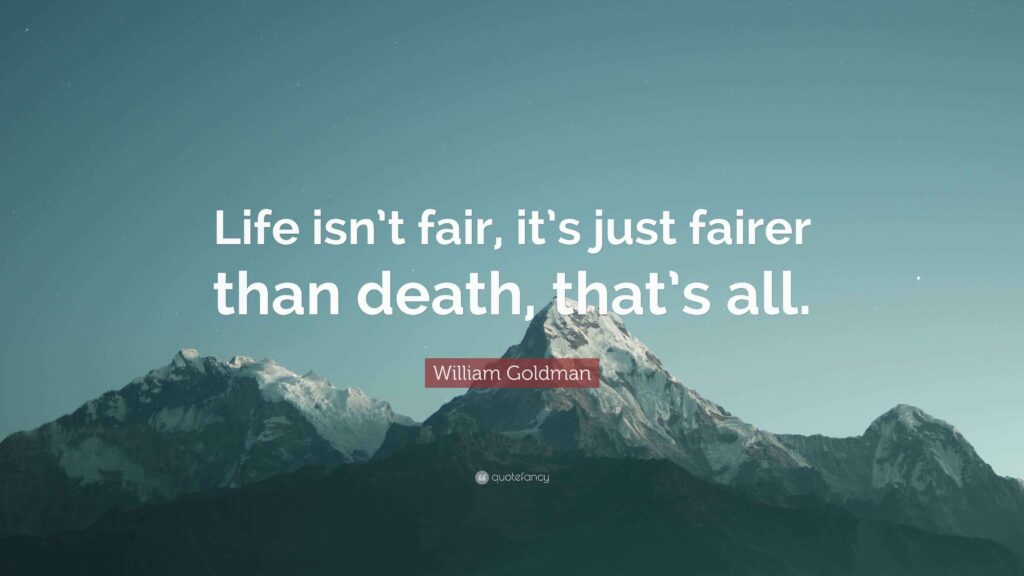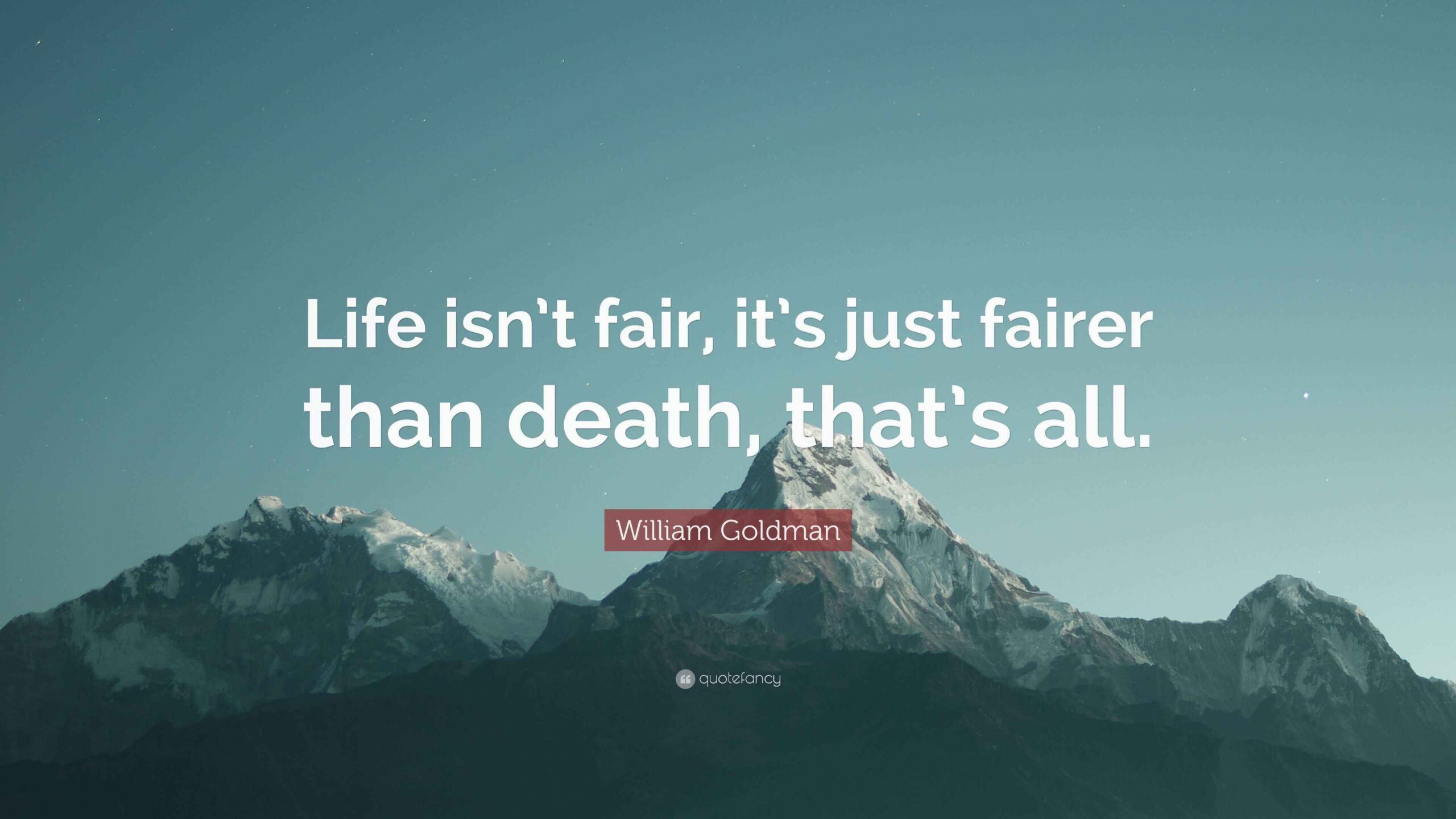
Life Isn’t Fair: Navigating Inequity and Finding Strength
The phrase “life isn’t fair” is a common refrain, often uttered in moments of disappointment, frustration, or even despair. It’s a simple statement, yet it encapsulates a profound truth about the human experience. From childhood playground squabbles to adult professional setbacks, the reality that life isn’t fair consistently presents itself. Understanding this fundamental principle, and more importantly, learning how to navigate its implications, is crucial for personal growth and resilience.
Understanding the Inherent Unfairness
The concept of fairness is deeply ingrained in our sense of justice. We expect that effort will be rewarded, that good deeds will be reciprocated, and that rules will be applied equally. However, the world rarely operates according to these ideals. Factors such as luck, privilege, systemic biases, and unforeseen circumstances often play a significant role in determining outcomes. To deny that life isn’t fair is to ignore the complex realities that shape our lives.
One of the primary reasons life isn’t fair stems from the unequal distribution of resources and opportunities. Some individuals are born into families with wealth, connections, and access to quality education, while others face poverty, discrimination, and limited prospects. This disparity creates a playing field that is inherently uneven. Similarly, societal structures and institutions can perpetuate inequalities, disadvantaging certain groups while favoring others. [See also: Overcoming Systemic Barriers]
Furthermore, random events and unforeseen circumstances can disrupt even the most carefully laid plans. A sudden illness, a natural disaster, or an economic downturn can derail careers, shatter dreams, and leave individuals struggling to cope. These events are often beyond our control, highlighting the unpredictable nature of life and the inherent unfairness that can arise. Accepting that life isn’t fair is the first step toward developing a more realistic and resilient mindset.
The Psychological Impact of Unfairness
Experiencing unfairness can have a profound psychological impact. It can lead to feelings of anger, resentment, frustration, and helplessness. When we perceive that we have been treated unjustly, it can erode our sense of trust in others and in the world around us. This can manifest as cynicism, bitterness, and a reluctance to engage fully in life.
Moreover, the perception of unfairness can contribute to mental health issues such as anxiety and depression. Constantly dwelling on past injustices can create a cycle of negative thinking, making it difficult to move forward. It is important to acknowledge these feelings and to find healthy ways to process them. Seeking support from friends, family, or a therapist can be invaluable in navigating the emotional challenges that arise from experiencing unfairness. It’s crucial to remember that acknowledging that life isn’t fair doesn’t mean accepting defeat. It means accepting reality and finding ways to thrive despite it.
Strategies for Coping with Unfairness
While we cannot eliminate unfairness from our lives, we can develop strategies for coping with its effects. One of the most important strategies is to cultivate resilience. Resilience is the ability to bounce back from adversity, to adapt to change, and to persevere in the face of challenges. It involves developing a positive mindset, building strong support networks, and learning from past experiences. [See also: Building Resilience in the Face of Adversity]
Another effective strategy is to focus on what we can control. While we cannot control external events or the actions of others, we can control our own responses. This involves setting realistic goals, taking proactive steps to achieve them, and maintaining a sense of agency in our lives. By focusing on what we can control, we can reduce feelings of helplessness and increase our sense of empowerment. Even though life isn’t fair, your reaction to it can be.
Furthermore, it is important to practice self-compassion. When we experience unfairness, it is easy to become self-critical and to blame ourselves for our misfortunes. However, it is essential to treat ourselves with kindness and understanding. This involves acknowledging our pain, accepting our imperfections, and offering ourselves the same compassion that we would offer to a friend in need. Self-compassion can help us to heal from past hurts and to build a stronger sense of self-worth.
Embracing Imperfection and Letting Go
Learning to embrace imperfection is another key aspect of coping with unfairness. Holding onto unrealistic expectations and striving for unattainable ideals can lead to disappointment and frustration. Accepting that we are all imperfect beings, and that mistakes are inevitable, can help us to be more forgiving of ourselves and others. This can also free us from the burden of trying to control every aspect of our lives.
Letting go of resentment is also crucial for moving forward. Holding onto anger and bitterness can poison our minds and prevent us from experiencing joy and fulfillment. Forgiveness, both of ourselves and of others, can be a powerful tool for healing. It does not mean condoning the actions that caused us pain, but it does mean releasing the emotional baggage that is weighing us down. Remember, dwelling on the fact that life isn’t fair will only hold you back.
Turning Unfairness into Opportunity
While unfairness can be a source of pain and frustration, it can also be an opportunity for growth and transformation. When we are faced with adversity, we are forced to confront our limitations and to develop new skills. This can lead to increased resilience, creativity, and resourcefulness. Many successful individuals have overcome significant challenges and turned their experiences of unfairness into a source of strength. [See also: Transforming Challenges into Opportunities]
Moreover, experiencing unfairness can inspire us to advocate for change and to fight for a more just and equitable world. When we see others being treated unfairly, we may be motivated to speak out against injustice and to work towards creating a society where everyone has the opportunity to thrive. This can involve volunteering our time, donating to charitable causes, or engaging in political activism. By turning our personal experiences of unfairness into a catalyst for positive change, we can make a meaningful difference in the lives of others.
The Importance of Perspective
Ultimately, our perception of fairness is subjective and influenced by our individual experiences and beliefs. What one person considers to be unfair, another person may see as simply a fact of life. Developing a broader perspective can help us to navigate the challenges of unfairness with greater equanimity. This involves recognizing that suffering is a universal human experience and that everyone faces challenges in their own way. It also involves appreciating the blessings in our lives and focusing on the positive aspects of our circumstances.
Practicing gratitude can be a powerful tool for shifting our perspective. Taking time to appreciate the good things in our lives, no matter how small, can help us to feel more content and less focused on what we lack. This can also increase our resilience and make us better able to cope with the challenges that arise. Remembering that life isn’t fair, but it also holds beauty and joy, is key.
Conclusion
Life isn’t fair, and acknowledging this truth is not an admission of defeat but a recognition of reality. It’s a call to action, an invitation to cultivate resilience, embrace imperfection, and turn adversity into opportunity. By understanding the inherent unfairness of life, developing effective coping strategies, and maintaining a positive perspective, we can navigate the challenges that come our way with greater strength, grace, and resilience. While we may not be able to control the circumstances that befall us, we can control how we respond to them. And in that response lies our power to create a meaningful and fulfilling life, even in the face of unfairness. The realization that life isn’t fair can be a catalyst for personal growth and a driving force for positive change in the world. It’s about making the most of what we have, advocating for a more just world, and finding strength in the face of adversity. Remember, even though life isn’t fair, you can still create a life of purpose and meaning. The world might not be fair, but your reaction to it can define you. Understanding that life isn’t fair allows you to appreciate moments of joy and success even more. So, accept that life isn’t fair, and strive to make a difference anyway. Keep pushing forward, even when life isn’t fair. And remember: that life isn’t fair doesn’t mean it can’t be beautiful. Embrace the chaos and find your strength in the knowledge that you are capable of overcoming any obstacle, even when life isn’t fair. Because in the end, it’s not about the fairness of the game, but how you play it.

